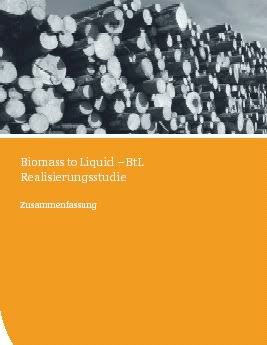German Energy Agency: biomass-to-liquids can meet up to 35% of Germany's fuel needs by 2030
 According to a long-awaited feasibility study [summary *.pdf/German] on second-generation biofuels, prepared by the Deutsche Energie-Agentur (German Energy Agency), large-scale biomass-to-liquid (BTL) fuel production could meet up to 35% of the country's liquid fuel needs by 2030.
According to a long-awaited feasibility study [summary *.pdf/German] on second-generation biofuels, prepared by the Deutsche Energie-Agentur (German Energy Agency), large-scale biomass-to-liquid (BTL) fuel production could meet up to 35% of the country's liquid fuel needs by 2030.Germany's technical biomass potential is large enough to meet 20% of all fuels. In a scenario where technological advancements and business competition lead to lower costs and more efficient production, and when biomass is imported, BTL-technologies could even meet up to 35% of the country's total liquid fuel needs by 2030. This scenario takes into account that biomass for liquid fuels will compete with biomass for the production of heat, power and green chemicals (such as bioplastics).
So far and for the foreseeable future, biofuels are the only renewable alternative to fossil fuels. They offer an important contribution to energy security, climate protection and create new added value in agriculture. -- Clemens Neumann, director of Renewable Resources in Germany's Ministry of Agriculture.Biomass supplies and logistics
The foundations have now been laid for the creation of a large-scale biomass-to-liquids industry in Germany, says Stephan Kohler, head of the German Energy Agency. A BTL-plant with a capacity to transform up to 1 million tons of biomass per annum was taken as the concept guiding the study. The study estimates that in such an optimally scaled plant, one liter of BTL-fuel would cost under 80 €urocents (US$3.98/gallon). (Interestingly, this cost is well above first-generation biofuels produced in the South.)
The report further indicates that secure biomass supplies are of crucial importance for the BTL-industry to take off. The researchers created five scenarios based on five technology development tracks, and five locations where the 1 million tonne plant might be located (Gelsenkirchen, Heilbronn, Leuna, Ludwigshafen, Wismar). These locations differ considerably when it comes to their local biomass potential (either from agriculture or from forestry) as well as to their infrastructure (one of them is a sea-port, another one is located alongside a main waterway and the others are located inland). In all five scenarios, the BTL-plant can be supplied smoothly, either by relying on local biomass, or by importing it from abroad. The research showed beneficial synergies between BTL-fuel production and existing petro-chemical industries (in the case of the sea-port location).
Contrary to biodiesel, BTL-technologies allow for the use of many different sources of biomass, be they wood and forestry residues or industrial and municipal waste, and of course dedicated energy crops. It is estimated that, on average, 4000 liters BTL-fuel per hectare can be obtained:
 biomass :: bioenergy :: biofuels :: energy :: sustainability :: biomass-to-liquids :: BTL :: Fischer-Tropsch ::biomass trade :: Germany ::
biomass :: bioenergy :: biofuels :: energy :: sustainability :: biomass-to-liquids :: BTL :: Fischer-Tropsch ::biomass trade :: Germany :: Different bioconversion methods have been tested in several pilot projects. In all of them, the biomass is first converted into synthesis gas. This gas is then purified and in a next step liquefied via a Fischer-Tropsch process.
Today's technologies are mature enough to be commercialised on a large scale. But increased research and technology efforts and experience with pilot plants show that there is still considerable room for efficiency increases, cost reductions and risk mitigation.
Earlier, the German federal government issued itself an ambitious biofuels target: by 2015, 8% of the country's liquid fuels must be derived from biomass. Biofuels of the second generation, such as the synthetic fuels derived from BTL-processes, will take up an ever greater share:
"BTL shows itself to be one of the most promising renewable energy technologies for liquid fuels. Because of their great potential to reduce CO2 emissions and their great efficiency, BTL-fuels will contribute considerably to reducing the climate change impact of the transport sector", says Dr. Thomas Schlick, director of the Verbandes der Automobilindustrie (German Car Industry Association).
Because BTL-fuels are entirely compatible with current and future engines, they can be used without the need for technical adaptations. This is why car manufacturers have been supporting research and development into biomass-to-liquid technologies for years. "The results of the present study show that the German car industry has bet on the right horse, when it decided to support BTL-efforts", adds Schlick.
Likewise political leaders now have anchor points with which they can craft a legislative and fiscal regime that will stimulate investments into the technology. "The existing tax incentives for BTL-fuels valid to 2015 are of key importance, but they do not suffice yet. The time horizon for the incentives has to be stretched well beyond 2015", says Kohler.
More information:
Deutsche Energie-Agentur: BTL-realisirungsstudie: Neue Biokraftstoffe haben großes Potenzial - Dec. 14, 2006
Deutsche Energie-Agentur: Summary of the Report [*.pdf / German]
 -------------------
-------------------
 Spanish company Ferry Group is to invest €42/US$55.2 million in a project for the production of biomass fuel pellets in Bulgaria.
The 3-year project consists of establishing plantations of paulownia trees near the city of Tran. Paulownia is a fast-growing tree used for the commercial production of fuel pellets.
Spanish company Ferry Group is to invest €42/US$55.2 million in a project for the production of biomass fuel pellets in Bulgaria.
The 3-year project consists of establishing plantations of paulownia trees near the city of Tran. Paulownia is a fast-growing tree used for the commercial production of fuel pellets.









0 Comments:
Post a Comment
Links to this post:
Create a Link
<< Home